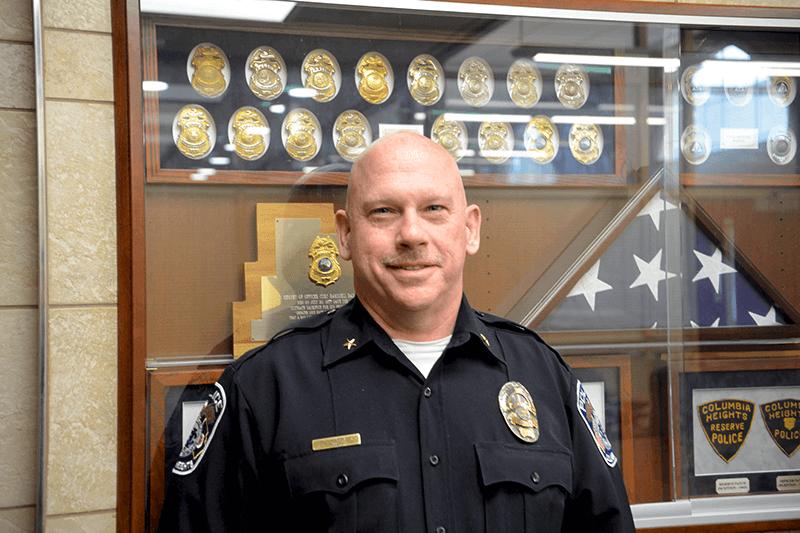Chief Lenny Austin has decided to call it quits after 35 years in police work, the last 29 with the Columbia Heights Police Department.
Brian Podany, chief of police in Blaine, said his colleague “is a combination of common sense and compassion. He’s a legend in Columbia Heights.
“During his time there, he’s seen the fabric of Columbia Heights change, but Austin has been good at adapting. He’s always ethical. He made sure the department changed as the times did.
“I’ll be sorry to see him go. He’s a funny guy. I’ve never seen him grouchy. Even in a tense situation, he’s upbeat. He’s got a good attitude.”
Mayor Amáda Márquez Simula said it was “an honor working alongside him.”
Márquez Simula said, “Chief Austin’s retirement marks the end of an era defined by exemplary leadership, collaborative spirit and unwavering dedication to our community safety. His commitment to diversity and community engagement has left an indelible mark on our community.”
Austin grew up in Ellsworth, Wis., and took his first law enforcement job in his hometown when he was 19 years old. He credits that early experience with his later career.
“In a small town, you don’t have many resources. You have to learn to solve problems by yourself because you may be the only officer in town.”
Austin was drawn to the Twin Cities and first applied with the Minneapolis Police Department. While police candidates are harder to find these days, that wasn’t the case in 1995. “There were a lot of applications and very few job openings. Just to fill out the application, my half of the alphabet filled up an auditorium.”
He has seen major changes in Columbia Heights over the years, both in its makeup and the type of crime that is prevalent.
“The city has become much more vibrant in recent years, especially from a redevelopment standpoint. Everything’s much more positive. Columbia Heights had a lot distressed properties some years ago.”
The biggest challenge on the streets in his early years was a crack epidemic in Minneapolis that was spreading to surrounding communities. “There was violent crime that came with it.”
He credits a lot of his development to Scott Nadeau, the prior chief of police. “I was very fortunate to have him as my mentor. He believed in community policing, working with the stakeholders, internally, externally and the school district.”
The biggest test in the future, he said, will be the recruitment and retention of top quality officers. Columbia Heights has 29 full-time sworn officers. “We’re pretty good right now, but it’s going to be a challenge.”
Other demands on the department these days are drug overdoses, primarily the opioids, including fentanyl, mental health problems and auto theft. “Our proximity to Minneapolis means we get many of the problems they’re experiencing. We know it’s going to impact us.”
He said the fentanyl overdose ex-plosion is a problem that can only be solved at the federal, state and local level. “It’s an all-hands-on-deck challenge, that’s for sure.”
One of the biggest successes in Austin’s seven years as chief has been the addition of social workers to the department’s staff. They often respond in tandem with the police officers and handle problems that are social rather than police work.
Austin thanked the City Council for getting behind the program and supporting it as the initial grant money went away. “It’s one of the greatest successes we’ve had. It’s the next level of customer service for our citizens. It’s become a pivotal part of this police department. It has allowed the police to get back to police work. I can’t imagine not having it.”
Columbia Heights was one of the first Minnesota cities to add social workers to the police staff, and the experiment was cited in the Police Executive Research Forum, a national journal on police work. The report said the program was a success and helped identify areas where police officers need to be trained.
Austin was also on board for a new program to have public safety personnel gain at least a basic knowledge of Spanish.
“Columbia Heights has become very multicultural. There are over 30 languages represented in our school system. We have to adapt and evolve if we want to maintain a high level of service.”
A podcast that is done about six times a year also keeps the police in closer contact with the community.
“Policing is a very human profession, and it always will be. The day-to-day interaction with the citizens is what matters most.”
The death of George Floyd in Minneapolis has changed the public’s perception of policing greatly, Austin said. He said in the end it will be a good change, “but now it’s something we still have to contend with.”
Austin pointed to a community survey in 2021 that showed most residents were positive toward the police department and said they felt safe in the community.
“What I’ll miss the most is watching the young policemen we have hired grow on the job, seeing them develop. I’ve been very lucky to work in a profession I love. Sure, there are plenty of ups and downs, but as you look back, it’s been enjoyable.”
What’s the most dangerous part of police work? “Most people think it’s when you’re called out and there’s a gun involved. But we’re all pretty well trained for those kind of situations. The most dangerous situation is when you show up after a call and the situation is completely different than what you anticipated.”
He has not yet mapped out his long-range plans for retirement at age 55. “I’m just going to take a couple of months, relax but try to stay busy. If someone offered me a police job, I’d politely decline.”
The city has hired a search firm to help with the process of finding a new chief.

Columbia Heights Police Chief Lenny Austin retires this month after 35 years in law enforcement, 29 of them in the Heights. (Al Zdon)